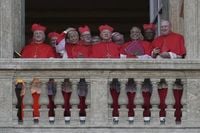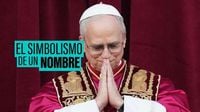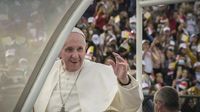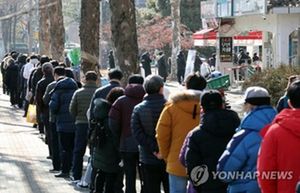The Vatican has officially announced the selection of its new Pope, León XIV, following the passing of Pope Francis I. The late pontiff, who served for twelve years, died at the age of 88 on April 21, 2025. His death left the esteemed position of Bishop of Rome vacant, prompting a Conclave of 133 cardinals to convene to elect his successor. As tradition dictates, the new Pope's first act is to adopt a papal name, a practice steeped in history.
The tradition of changing names upon assuming the papacy dates back to the 6th century, when Pope John II became the first to abandon his birth name, Mercurio, which was deemed inappropriate for a leader of the Church. This act of renaming symbolizes a new beginning, reflecting the Pope's mission and aspirations. Each name carries its own significance, often honoring previous popes or saints admired by the new pontiff.
León XIV, the fourteenth pope to adopt this name, follows in the footsteps of León XIII, a highly influential figure known for his teachings on social justice and workers' rights. By choosing this name, the new Pope appears to signal a commitment to continue and deepen the legacy of concern for the marginalized and the Church's involvement in social issues.
As the white smoke billowed from the Sistine Chapel around 18:08 (6:08 PM), the world awaited the announcement of the new pontiff. Cardinal Kevin Joseph Farrel had temporarily administered the Vatican until the election. The moment the new Pope is revealed is not just a formality; it is laden with historical and spiritual meaning.
Upon election, the new Pope is asked in Latin, "Quo nomine vis vocari?" (What name do you wish to be called?). The choice reflects personal connections to saints or previous popes, encapsulating the intentions and vision the new leader wishes to convey. This process is integral to the papal ritual, marking the transition into a new identity.
Throughout history, certain names have been favored. The name Juan has been adopted by 23 popes, while Gregorio and Benedicto have each been chosen 16 times. León, now chosen for the fourteenth time, joins a list of names that also includes Clemente, which has been used 14 times. Interestingly, no pope has ever chosen to take the name Pedro, honoring the first Pope of the Church, Saint Peter.
While there are no strict rules governing the choice of name, it is seen as a pivotal moment in establishing the papal identity. For instance, Pope Benedict XVI chose his name to honor Benedict XV, who led the Church during World War I, while Pope Francis's choice was a nod to Saint Francis of Assisi, embodying humility and a commitment to the poor.
In a ceremony that captivates millions, the announcement of the new papal name is traditionally made from the central loggia of St. Peter's Basilica, where the protodeacon proclaims, "Habemus Papam!" (We have a Pope!). This moment not only reveals the new name but also serves as a message of continuity or reform, depending on the name chosen.
The selection of León XIV is particularly poignant in light of the social teachings associated with previous popes of the same name. León XIII was known for addressing the rights of workers and advocating for social justice during a time of significant change. The newly elected Pope's choice suggests an intention to uphold and expand upon these teachings, potentially steering the Church towards a renewed focus on social issues.
As the world reflects on the legacy of Pope Francis, who was known for his emphasis on humility and outreach to the needy, the election of León XIV may indicate a continuation of this compassionate approach. The choice of name is not merely a personal preference; it carries the weight of expectations and the hopes of the faithful.
In the wake of the election, discussions have already begun regarding the ideological direction of León XIV's papacy. Will he maintain the reformist path set by his predecessor, or will he take a more conservative stance? The choice of name alone does not dictate the course of his papacy, but it certainly sets the tone for what lies ahead.
As the Catholic Church enters this new chapter, the significance of the papal name remains a powerful symbol of leadership and vision. The name chosen by León XIV resonates with a commitment to social justice and the Church's mission to serve the marginalized.
In summary, the election of León XIV marks a significant moment in the Church's history, intertwining tradition with the hopes of millions. The name he has chosen embodies a legacy of social concern, and the world will be watching closely to see how he interprets this calling.






